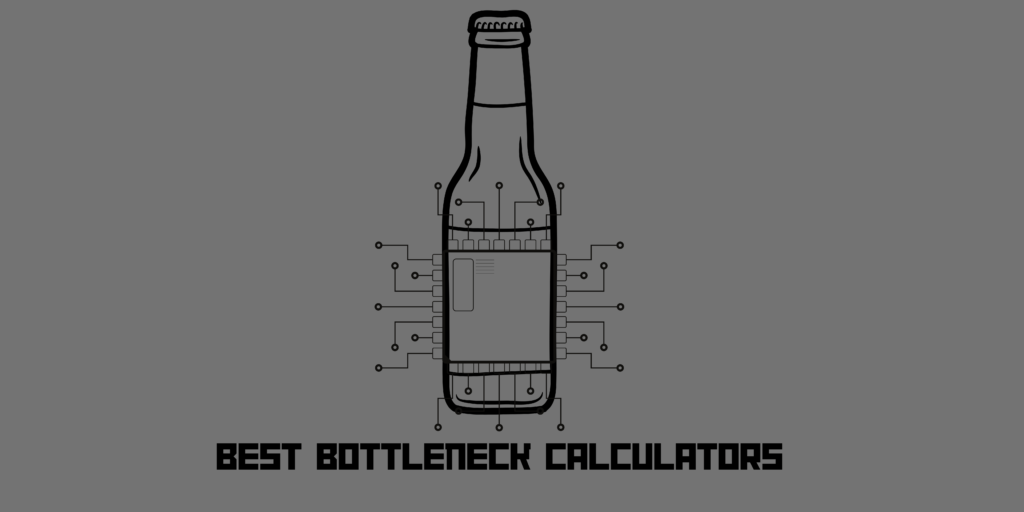In this fast-paced age of technology, building a PC has become more accessible than ever. Many people these days are able to assemble high-performance computers thanks to simplified components, easily available online tutorials, and intuitive software interfaces.
However, one thing that remains a constant challenge in the world of PC building is bottlenecks. It happens when one or more components in a system cannot keep up with the others, resulting in an overall reduction in performance.
Bottleneck calculators, therefore, are used to analyze a PC’s components to find out which one is lagging behind others in the configuration. But which is the best bottleneck calculator for a laptop? Are bottleneck calculators even reliable?
Such questions lurk in the minds of every PC builder dealing with bottleneck issues. To make the task easier for you, we have compiled this list of the best PC bottleneck calculators.
Contents
Bottleneck Calculator Meaning
A computer gives the best performance when all its components are in top-notch condition. For example, your CPU needs to be as fast as your GPU to properly run programs that require a lot of GPU power.
A bottleneck in this situation refers to a condition in which one or more of a PC’s components are unable to keep up with the other components. This results in slowdowns, freezes, or crashes, hindering the overall performance of the system. Stability issues can also occur in some cases, leading to Blue Screen of Death(BSOD).
Now, you need to check how much of your computer’s resources are being used to figure out if it’s a component that is causing the slowdowns. This is where PC bottleneck calculators come in. These calculators analyze your computer to find the component that is lagging behind the others in configuration, i.e., the component that is acting as a bottleneck.
7 Best Bottleneck Calculators for Gaming and PC
PC Builds Bottleneck Calculator
The best bottleneck calculator out there is arguably the PC Builds one. The website has a user-friendly interface that is easy to navigate, even for newbies. It has several features that help you analyze and identify potential bottlenecks while building a PC.
On PC Builds, first, you have to select your processor, graphics card, screen resolution, and the primary purpose, i.e., whether it is for CPU-intensive processes, GPU-intensive ones, or general processes. It then calculates whether the combination of the components is perfect for your selected purpose or not.
If a possible bottleneck is detected, it recommends other products that you can use to get the desired performance.
PC Build is regularly updated with the latest configurations and hardware components. On the downside, there is no option to select the RAM size and frequency here.
Build Redux
One of the top bottleneck calculators out there is Build Redux. It is one of the leading PC manufacturers and has a specific section on its website for building your own PC. Here, you can customize components to find the perfect combination to avoid bottlenecks and get the best performance.
Build Redux is primarily tailored for gaming, but PC builders often rely on it due to its modern and user-friendly interface. You can configure your entire system in with a few steps and even buy hardware components directly from here.
CPU Agent Bottleneck Calculator
Another popular bottleneck calculator is the CPU Agent platform. It has a plainer design than other calculators, but it does its job well. You have to enter specifications about the CPU, GPU, RAM size and speed, resolution, and quality settings to get information about potential bottlenecks.
CPU Agent gives a detailed analysis of the performance of your selected PC components. Apart from this, there are several other tools, such as PC builds comparison and FPS calculator, that can help you make a decision.
It is the perfect bottleneck calculator for those building a PC on a budget, as they can even compare average prices for each selected component here. CPU Agent is, however, not ad-free, so you may want to look into an ad-blocker before using it.
Techwafer Bottleneck Calculator
Techwafer is another bottleneck calculator that uses an advanced algorithm to predict a given CPU and GPU combination that might cause bottlenecks in a computer. It gives out a score for different hardware combinations, and you can compare them to build your PC accordingly.
Techwafer is largely reliable and can be used to get an idea of how a particular CPU and GPU combination will perform in a computer.
Task Manager
Windows users are familiar with Task Manager. They often use it to close applications, stop background services, and check the usage of RAM. However, not many realize that it can be a useful system monitoring tool and function as the ideal post-build PC bottleneck calculator.
It does so by providing real-time information about CPU, GPU, memory, and disk usage. This can be helpful to detect whether a component is constantly running at maximum capacity or not. Task Manager has only gotten better and better with each Windows edition and now provides detailed information about different components and processes.
MSI Afterburner
MSI Afterburner is a post-build resource monitoring tool that shows the utilization of your CPU, GPU, and RAM. It is a popular and effective tool to calculate bottlenecks while running games and other programs. This tool works can be used with both MSI hardware and AMD components.
HWiNFO
HWiNFO is also a resource monitoring tool that presents stats about the usage of your PC hardware components. It gives detailed information regarding the utilization of the CPU, GPU and various other components. You can then use this information to trace the components slowing down your PC.
Is Bottleneck Calculator Accurate?
Bottleneck calculators are often used to get insights into potential bottlenecks on a PC. However, are they completely reliable? The answer is a little complicated. Bottleneck calculators can be used to get a general idea of the potential stability or performance of a computer system.
Their reliability, however, varies, and you should take every result with a grain of salt. Each calculator uses a certain approach that may overlook some factors.
Various factors like software usage, background processes, and system configuration affect bottlenecks in ways that calculators using standardized benchmarks cannot accurately predict. Therefore, you should never rely solely on them. You have to use common sense and do some manual investigation to correctly identify the issues with your PC.




